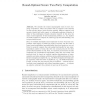Free Online Productivity Tools
i2Speak
i2Symbol
i2OCR
iTex2Img
iWeb2Print
iWeb2Shot
i2Type
iPdf2Split
iPdf2Merge
i2Bopomofo
i2Arabic
i2Style
i2Image
i2PDF
iLatex2Rtf
Sci2ools
104
click to vote
CRYPTO
2004
Springer
2004
Springer
Round-Optimal Secure Two-Party Computation
Abstract. We consider the central cryptographic task of secure twoparty computation, where two parties wish to compute some function of their private inputs (each receiving possibly different outputs) and security should hold with respect to arbitrarily-malicious behavior of either of the participants. Despite extensive research in this area, the exact round-complexity of this fundamental problem (i.e., the number of rounds required to compute an arbitrary poly-time functionality) was not previously known. Here, we establish the exact round complexity of secure two-party computation with respect to black-box proofs of security. We first show a lower bound establishing (unconditionally) that four rounds are not sufficient to securely compute the coin-tossing functionality for any superlogarithmic number of coins; this rules out 4-round protocols for other natural functionalities as well. Next, we construct protocols for securely computing any (randomized) functionality using only fi...
Related Content
| Added | 01 Jul 2010 |
| Updated | 01 Jul 2010 |
| Type | Conference |
| Year | 2004 |
| Where | CRYPTO |
| Authors | Jonathan Katz, Rafail Ostrovsky |
Comments (0)

